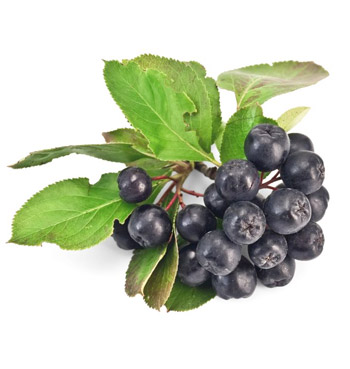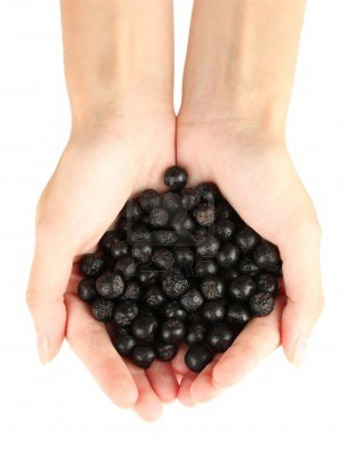|
|
|
 , ,
Font size |
Encyclopedia of Health Benefits of Berries

7. Chokeberries:
The fruit is a small pome and has a very bitter flavor. There are two species
of chokeberries, red chokeberry, and black chokeberry. The purple chokeberry is
a hybrid of the two
berries listed above. It is used to make juices, jam, wine, etc. It is also used
as a flavoring and coloring agent. It is high in vitamin C and antioxidants.
In recent years, nutritionists and fruit lovers around the world have come to
realize the amazing health benefits of chokeberry. This berry is the fruit of a
deciduous shrub that is
found in the state of Ohio and the eastern part of North America. There are two
varieties of chokeberry, namely, the black chokeberry and red chokeberry. The
red chokeberry
has a sweeter taste than the black chokeberry, which is slightly bitter, but
both varieties contain high amounts of antioxidants that are beneficial to
health. Here are some of the
possible health benefits of chokeberry.
Reduces Oxidative Stress
Chokeberry has a mixture of anthocyanins, procyanidins and phenolic acid, and
this makes it one of the most potent sources of antioxidants. These antioxidants
can prevent free radicals from damaging components in the cells and causing oxidative stress. As
such, chokeberry can be used to treat various health problems that are related
to oxidative stress,
such as cancer, cardiovascular diseases, atherosclerosis, arthritis and certain
neurological diseases.
Counters Metabolic Syndrome
According to a study that was conducted in 2010, the consumption of chokeberry
may be effective in the treatment of metabolic syndrome. Metabolic syndrome is a
condition
that can contribute to high blood pressure, high cholesterol, inflammation and
excess fat in the body. In the study, 25 people who were suffering from
metabolic syndrome
consumed 100mg of chokeberry extract three times a day for a period of two
months. Researchers noticed that the subjects� blood pressure and LDL
cholesterol decreased
significantly at the end of the study.
Help Diabetes Patients
There is also a possibility that chokeberry can reduce blood glucose levels, and
therefore, it may be beneficial to diabetes patients. In a study that was
published in 2002, a number
of diabetes patients were given 200ml of sugar-free chokeberry juice everyday
for three months. The results showed that the patients experienced a decrease in
blood sugar
levels.
Helps to Maintain Healthy Weight
If you are planning to lose weight, chokeberry is an excellent food choice for
you. It contains low amounts of calories and fat, and it has a weight balancing
effect on your body. It
has the ability to prevent the body from storing too much fat, especially in the
region around the abdomen.
Provides Protection for the Eyes
Chokeberry also contains high amounts of flavonoid antioxidants, such as luteins,
zeaxanthins and carotenes. It is known that zeaxanthins have the ability to
filter harmful
ultraviolet rays, and therefore, can protect the eyes from macular degeneration,
which usually occurs in elderly people.
Despite the fact that many studies have been conducted on chokeberry, there is
still insufficient scientific support to confirm the specific health benefits of
the fruit. If you wish to
use chokeberry to treat a specific condition, it is advisable that you get
approval from your doctor first. Presently, chokeberry extract is sold as a
health supplement in many health
food stores in the U.S. A powder form of the fruit is also available, and it is
widely used for making protein shakes, smoothies and ice cream.
Health benefits of chokeberry
 Chokeberries are low in calories and fats. 100 g of fresh berries contain 47
calories. Nonetheless, they are one of the nature's richest sources of flavonoid
anthocyanin
antioxidants. In addition, the berries contain handsome levels of minerals, and
vitamins, and dietary fiber obtained through their peel. Chokeberries are low in calories and fats. 100 g of fresh berries contain 47
calories. Nonetheless, they are one of the nature's richest sources of flavonoid
anthocyanin
antioxidants. In addition, the berries contain handsome levels of minerals, and
vitamins, and dietary fiber obtained through their peel.
The oxygen radical absorbency capacity or ORAC (measurement of antioxidant
strength of food items) demonstrates chokeberry with one of the highest values
yet recorded
among berries-16,062 micro-moles of Trolox Equivalents (TE) per 100 g.
Black color berries consist of significantly high amounts of phenolic flavonoid
phyto-chemicals called anthocyanins. Total anthocyanin content is 1480 mg per
100 g of fresh berries,
and proanthocyanidin concentration is 664 mg per 100 g (Wu et al. 2004, 2006).
Scientific studies have shown that consumption of berries on a regular basis
offers potential
health benefits against cancer, aging and neurological diseases, inflammation,
diabetes, and bacterial infections. (- By Dr. Paul Gross, 2007-07-09).
Laboratory analyses of anthocyanins in chokeberries have identified the
following individual chemicals: cyanidin-3-galactoside, quercetin, peonidin,
delphinidin, petunidin, epicatechin,
caffeic acid, pelargonidin and malvidin. These flavonoid poly-phenolic
antioxidants have proven health benefits through scavenging dangerous
oxygen-free radicals from the body.
Cancer research on anthocyanins where in black chokeberry preparations were
first used to inhibit chemically induced cancer in the rat esophagus was found
to reduce the disease
severity by 30-60% and that of the colon cancer by up to 80%. Effective at both
the initiation and promotion/progression stages of tumor development, these
berries are a
practical research tool and hold a promising therapeutic source, since they
contain the highest amount of anthocyanins among native North American berries
[J. Agric. Food Chem.
50 (12): 3495�500].
They are also rich in flavonoid anti-oxidants such as carotenes, luteins and
zeaxanthins. Zea-xanthin has photo-filtering effects on UV rays and thus
protects eyes from age-related
macular disease in the elderly (ARMD).
Further, they are an also good source of many antioxidant vitamins like
vitamin-C, vitamin A, vitamin E, beta-carotene and folate and minerals like
potassium, iron and
manganese. 100 g of fresh berries provide about 35% of daily-recommended levels
of vitamin C.
Next..
Dated 12 March 2013

|
|
|
|
|
|
|









